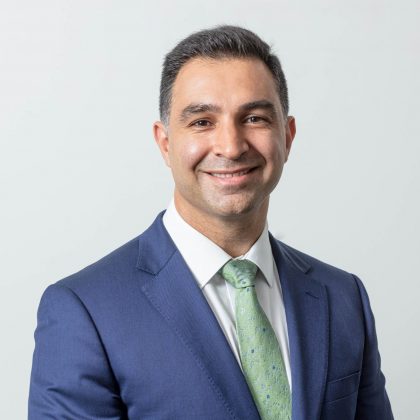
A/Prof Yasser Khatib
BSc (Med), MBBS, M Sports Med, M Med (Clin Epi), FAOrth A, PhD.
Senior clinical lecturer, School of Medicine Nepean,
Sydney University. Independent Medical Examiner.
Dr Yasser Khatib is an Australian educated and trained orthopaedic surgeon who is committed to caring for patients with orthopaedic conditions. His practice is based in the Nepean, Macarthur and Hawkesbury regions of Sydney, and his primary aim is to provide the highest quality of care.
Dr Khatib is a highly trained and experienced hip and knee replacement surgeon with post-fellowship training in the field of primary and revision hip and knee replacement at the St Michael’s Hospital, University of Toronto, Canada. Since completing his orthopaedic training, he has been committed to caring for patients with hip and knee arthritis who require joint replacement surgery, including patients who require complex revision hip and knee replacement for various conditions such as trauma, infection or failing prosthesis. Dr Khatib has a strong research interest in this field, channelled into many research projects related to total knee replacement surgery. This culminated in a Doctorate of Philosophy (PhD) thesis through the University of New South Wales with a focus on “Improving patient outcomes after total knee replacement surgery.”
Dr Khatib is a strong proponent of cutting-edge techniques in the field of joint replacement and is trained in performing hip replacement surgery through the direct anterior approach, without the use of traction devices. His choice for this approach is that in the right patient, this technique is associated with less pain and earlier restoration of function in the early recovery phase after surgery.
In addition to the field of joint replacement, Dr Khatib has completed a Master in Sports Medicine, UNSW, and is passionate about the management of athletes and sports related injuries.
He has a high level of expertise in the management of sport and trauma conditions and returning athletes to the filed including Anterior Cruciate Ligament (ACL) surgery and he is also experienced in more complex multi-ligament knee injuries including surgery for the Posterior Cruciate Ligament (PCL), the lateral collateral ligament and the Posterolateral Ligament Complex (PLC).
In addition to his clinical practice, Dr Khatib has developed and maintained a commitment in teaching and post-graduate study. He is a senior clinical lecturer at the Sydney University School of Medicine Nepean and is actively involved with undergraduate and postgraduate teaching of medical students, junior medical officers and orthopaedic trainees. He is a former Director of Orthopaedic Training, Nepean hospital; a former Director of surgical training courses for the Royal Australasian College of Surgeons, and has continual involvement in research with book and article publications in international orthopaedic journals and many presentations in national and international scientific meetings.
Philosophy
“I believe the best outcome in patient care is achieved by considering each patient individually and offering a tailor-made management plan. My philosophy is to commit the time necessary through the use of excellent communication with patients and other health practitioners to educate patients about their condition and explain the non-operative and operative treatment options available, to provide them with sound, evidence-based clinical advice. This also means that surgery is only one option afforded to my patients for the treatment and management of their condition, not the only option…” Dr Yasser Khatib
Special Interest
- Primary and Revision Knee Replacement
- Unicompartmental Knee Replacement
- Osteotomies and Joint Preserving Surgery Sports Surgery
- Trauma and Reconstructive Surgery
- Upper and Lower Limb
- Work Related Injury Management
Qualifications
- Bachelor of Science (Medicine) Bachelor of Medicine Bachelor of Surgery, UNSW 2003
- Master of Sports Medicine, UNSW 2008
- Fellowship in primary and revision hip and knee arthroplasty, St Michael’s Hospital, Toronto, Canada, 2012
- Master of Medicine (Clinical Epidemiology), Sydney University 2016
- Doctorate of Philosophy, PhD, UNSW 2020
Private Hospitals
- Nepean Private Hospital
- Campbelltown Private Hospital
- St. John of God Hospital, Hawkesbury District Health
Public Hospitals
- Nepean Public Hospital
- St. John of God Hospital, Hawkesbury District Health
